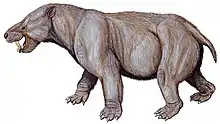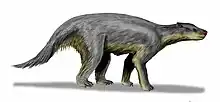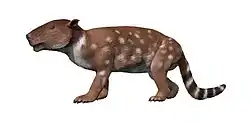| Titanoides Temporal range: Late Paleocene, | |
|---|---|
 | |
| Titanoides primaevus | |
| Scientific classification | |
| Domain: | Eukaryota |
| Kingdom: | Animalia |
| Phylum: | Chordata |
| Class: | Mammalia |
| Order: | †Pantodonta |
| Superfamily: | †Pantolambdoidea |
| Family: | †Titanoideidae Patterson, 1934 |
| Genus: | †Titanoides Gidley, 1917 |
| Type species | |
| †Titanoides primaevus Gidley, 1917 | |
| Species[1] | |
| |
Titanoides is an extinct genus of pantodont mammal that lived in North Dakota and as far north as central Alberta. They were up to 3 m (9.8 ft) long and up to 150 kg (330 lb) in weight, being the largest mammals of their habitat, a tropical swampland where the main predators were crocodiles. They had a bear-like appearance with huge canines, short limbs and five clawed digits; however, they were herbivores and probably had traits and attributes more similar to diprotodontids.[2][3]
References
- ↑ "Pantodonta". After McKenna & Bell (1997) and Alroy (2002). Retrieved 2 November 2013.
- ↑ "Titanoides" (PDF).
- ↑ "Pantodonts, uintatheres and xenungulates: The first large herbivorous mammals". Paleocene mammals of the world.
External links
- "Ferae Past and Present (Phylogenetic tree)" at Okapiland
This article is issued from Wikipedia. The text is licensed under Creative Commons - Attribution - Sharealike. Additional terms may apply for the media files.

